Columban Fr Maurice Foley RIP
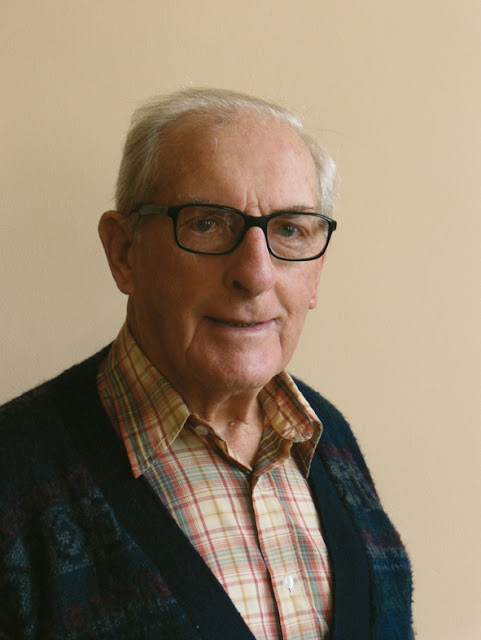





May he rest in peace.

Crucifix, St Columban’s Cemetery, Dalgan Park






May he rest in peace.

Crucifix, St Columban’s Cemetery, Dalgan Park
What is the Happiness of Christmas?
by Fr Shay Cullen

The Nativity, El Greco [Web Gallery of Art]
What is it that makes Christmas so beautiful, so cheerful and a happy time especially for children? It has to be the gift-giving, the time when children look forward to gifts and signs of love and caring and sharing. The children of some well-off families receive so many gifts through the years that it has no special impact on them to receive more. There are the children of poor families that a gift at Christmas is a joy they never forget because they have so little in this world. And so that is what Christmas is about: the change of heart and mind when the rich and the well-off reach out to the poor to do something to make this a more just and equal society. It’s about caring and sharing.
It may not be much to ask but with the millions of displaced children in the world today, hundreds of thousands hungry and starving, it will be our duty and honor and a blessing for us to be able to share with them. To give from our abundance and not to keep it all for ourselves is the spirit of Christmas. This is what should be with us all our lives- helping others not just ourselves. It’s a natural virtue to care and share with our own families, but to help the stranger in need is an act of great goodness and virtue. That is being the good neighbor.
A frugal Christmas is in order and we are challenged to have the courage and the love of neighbors and to stop and ask, “Who is my neighbor?” Well in case you have forgotten that important teaching of Jesus of Nazareth, I remind you it is the traveler who was beaten and robbed and left for dead.
Continue here.

Columban Fr Robert McCulloch at Embassy of Pakistan, Rome
Fr McCulloch, an Australian, is Procurator General of the Columbans in Rome. He spent the early years of his priesthood in Mindanao, Philippines, and later spent 34 years in Pakistan, being one of the pioneering group of Columbans to go there in 1979.
Ambassador Nadeem Riyyaz of the Islamic Republic of Pakistan to Italy again hosted the annual Christmas celebration on December 14 at the embassy chancery in Rome. The celebration was attended by Pakistani seminarians, sisters and priests studying in Rome as well as members of the general councils of religious congregations who have foundations in Pakistan.
Members of the diplomatic corps including the ambassador of Italy to the Holy See, chancery staff and Pakistanis working at FAO and other international organizations based in Rome were also present. The celebration including singing of Christmas carols in Urdu, Punjabi, Italian and English.
Fr Robert McCulloch, Procurator-General of the Missionary Society of St Columban, thanked Ambassador Riyyaz for hosting the Christmas celebration and extended greetings both for Christmas and for the Muslim feast of Eid-e-Milad-ul- Nabi which had been celebrated several days earlier. Fr McCulloch noted that this was the fifth celebration of Christmas at the Pakistan embassy which had been begun by Ambassador Tehmina Janjua, currently the Pakistan ambassador to the UN in Geneva. Both ambassadors received their education at Catholic schools in Pakistan, Ambassador Janjua from Jesus and Mary convent schools and Ambassador Riyyaz from the Patrician Brothers at St Anthony’s High School in Lahore.
Fr McCulloch thanked Ambassador Riyyaz for his outstanding gesture of friendship which manifests the commitment both of the Pakistan Embassy in Italy and of the Government of Pakistan to work towards religious harmony.

Adoration of the Shepherds
Jacopo Bassano [Web Gallery of Art]
What has come into being in him was life, and the life was the light of all people (John 1:4).
The Solemnity of the Nativity of the Lord has four different Mass formularies, each with its own prayer and readings. Any of the four fulfills our obligation to attend Mass. These are:
Vigil Mass, celebrated ‘either before or after First Vespers (Evening Prayer) of the Nativity’; that means starting between 5pm and 7pm.
Mass During the Night, known before as ‘Midnight Mass’. In many parts of the world it does begin at midnight but here in the Philippines since the 1980s it begins earlier, usually at 8:30pm or 9pm.
Mass at Dawn.
Mass During the Day.
When you click on ‘Readings’ below from the New American Bible you will find links to the readings for each of the four Masses. The readings from the Jerusalem Bible for the four Masses are all on one page.
Readings (New American Bible: Philippines, USA)
Readings (Jerusalem Bible: Australia, England & Wales, India [optional], Ireland, New Zealand, Pakistan, Scotland, South Africa)
Gospel John 1:1-18 (New Revised Standard Version, Catholic Edition, Canada)
In the beginning was the Word, and the Word was with God, and the Word was God. He was in the beginning with God. All things came into being through him, and without him not one thing came into being. What has come into being in him was life, and the life was the light of all people. The light shines in the darkness, and the darkness did not overcome it.
There was a man sent from God, whose name was John. He came as a witness to testify to the light, so that all might believe through him. He himself was not the light, but he came to testify to the light. The true light, which enlightens everyone, was coming into the world.
He was in the world, and the world came into being through him; yet the world did not know him. He came to what was his own, and his own people did not accept him. But to all who received him, who believed in his name, he gave power to become children of God, who were born, not of blood or of the will of the flesh or of the will of man, but of God.
And the Word became flesh and lived among us, and we have seen his glory, the glory as of a father’s only son, full of grace and truth. (John testified to him and cried out, “This was he of whom I said, ‘He who comes after me ranks ahead of me because he was before me.’”) From his fullness we have all received, grace upon grace. The law indeed was given through Moses; grace and truth came through Jesus Christ. No one has ever seen God. It is God the only Son, who is close to the Father’s heart, who has made him known.
John 1:1-4
This is the Sign Language I am familiar with in the Philippines.
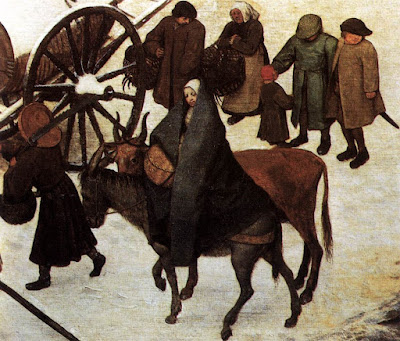
The Census at Bethlehem (detail)
Pieter Bruegel the Elder [Web Gallery of Art]
This was the moment when even energetic Romans
Could find nothing better to do
Than counting heads in remote provinces.
By U.A. Fanthorpe
This was the moment when Before
Turned into After, and the future’s
Uninvented timekeepers presented arms.
This was the moment when nothing
Happened. Only dull peace
Sprawled boringly over the earth.
This was the moment when even energetic Romans
Could find nothing better to do
Than counting heads in remote provinces.
And this was the moment
When a few farm workers and three
Members of an obscure Persian sect
Walked haphazard by starlight straight
Into the kingdom of heaven.

Adoration of the Shepherds, Murillo [Web Gallery of Art]
And this was the moment
When a few farm workers and three
Members of an obscure Persian sect
Walked haphazard by starlight straight
Into the kingdom of heaven.

Gradual 1 for San Michele a Murano
Don Silvestro Dei Gherarducci [WebGallery of Art]
But for a dream, born in a herdsman’s shed,
And for the secret Scripture of the poor.
To My Daughter Betty, The Gift of God
In wiser days, my darling rosebud, blown
To beauty proud as was your Mother’s prime.
In that desired, delayed, incredible time,
You’ll ask why I abandoned you, my own,
And the dear heart that was your baby throne,
To die with death. And oh! they’ll give you rhyme
And reason: some will call the thing sublime,
And some decry it in a knowing tone.
So here, while the mad guns curse overhead,
And tired men sigh with mud for couch and floor,
Know that we fools, now with the foolish dead,
Died not for flag, nor King, nor Emperor,
But for a dream, born in a herdsman’s shed,
And for the secret Scripture of the poor.
Tom Kettle wrote To My Daughter Betty, The Gift of God just four days before he was killed during an assault on the village of Ginchy, France, on 9 September 1916.
The Secret Scripture of the Poor was the title given to a collection of writings by Columban Fr John Henaghan published posthumously in 1951. He was killed by the Japanese during the Battle of Manila in February 1945.
Mary’s Boy Child
Written by Jester Hairston in 1956. The lyrics are in a Caribbean dialect of English.
.

The Dream of St Joseph, Georges de la Tour [Web Gallery of Art]
Readings (New American Bible: Philippines, USA)
Readings (Jerusalem Bible: Australia, England & Wales, India [optional], Ireland, New Zealand, Pakistan, Scotland, South Africa)
Gospel Matthew 3:1-12 (New Revised Standard Version, Anglicised Catholic Edition)
Now the birth of Jesus the Messiah took place in this way. When his mother Mary had been engaged to Joseph, but before they lived together, she was found to be with child from the Holy Spirit. Her husband Joseph, being a righteous man and unwilling to expose her to public disgrace, planned to dismiss her quietly. But just when he had resolved to do this, an angel of the Lord appeared to him in a dream and said, ‘Joseph, son of David, do not be afraid to take Mary as your wife, for the child conceived in her is from the Holy Spirit. She will bear a son, and you are to name him Jesus, for he will save his people from their sins.’ All this took place to fulfil what had been spoken by the Lord through the prophet:
‘Look, the virgin shall conceive and bear a son,
and they shall name him Emmanuel’,
which means, ‘God is with us.’ When Joseph awoke from sleep, he did as the angel of the Lord commanded him; he took her as his wife.
Responsorial Psalm [NAB Lectionary]
In December 2002 I met a man in Manila, Mang Pepe, and his daughter Ligaya whose story reminded me so much of that of Joseph and Jesus in today’s gospel. The story of Mang Pepe and Ligaya is told here by a Columban lay missionary from Korea, Columba Chang, who worked for many years in the Manila area and whose ministry at the time she wrote this story was to families affected by HIV/AIDS. The names used aren’t their real names. ‘Pepe’ is a nickname for a man named Jose or Joseph. ‘Mang’ is a Tagalog term of respect for a man older than oneself. ‘Aling’ is the equivalent term for a woman. The name ‘Ligaya’ means ‘Joy’. The story was first published, as I recall, in a newsletter of Caritas Manila and I used it in the November-December 2003 issue of MISYON, the Columban magazine in the Philippines that I edit. I republished it in the November-December 2015 issue of the magazine, now called MISYONonline.com. I think it is a story worth telling over and over again. Columba is now based in Myanmar as a member of a small team of Columban Lay Missionaries there. I have updated the introduction.
by Columba Chang
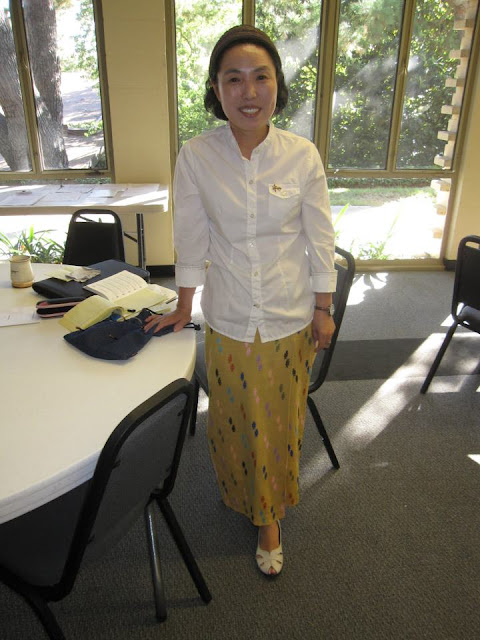
Columba Chang, 2012
According to official Philippine government figures there were more than ten million Filipinos, about ten percent of the population, overseas as of December 2012, more than half of them temporary or irregular in the countries where they are staying. These temporary and irregular residents are mostly Overseas Filipino Workers (OFWs). They greatly help our country’s economy by the money they send home. However sometimes we seem to take them for granted, thinking that they have an easy life abroad. Read Aling Maria’s story and find out the dangers our OFWs face and the abuses they experience. We thank ‘Mang Pepe’ for his help in writing this article in which we’ve changed the names.
I met Mang Pepe and his daughter Ligaya through my work with Caritas Manila. I visit the family regularly. They live in a poor part of the city and Mang Pepe makes a living by doing odd jobs. My work takes me to families affected by HIV/AIDS. I knew Mang Pepe’s story before he shared it with the congregation at the Saturday evening Mass in Baclaran Church on 7 December 2002 at the end of a celebration organized by Caritas Manila for World AIDS Day. (Baclaran Church is the huge Redemptorist church in Parañaque City, Metro Manila, filled to capacity all day every Wednesday when the Perpetual Novena to the Mother of Perpetual Help is celebrated from morning till evening.)
Baclaran Church [Wikipedia]
Greener Pastures
Mang Pepe and his wife Aling Maria were having difficulties putting their five children through school. This sometimes led to arguments. Eventually Aling Maria decided to work in the Middle East. She felt happy when accepted as a nursing aide with a two-year contract in the UAE. She prepared her documents. She and Pepe sold their house and lot for her fare and placement fee. She flew out on 5 February 1989, full of hope for her family’s future financial stability.
Aling Maria soon discovered that her contract as a nursing aid was terminated just a few months after she arrived, without any hope of renewal. But she didn’t want to go back to the Philippines with an empty pocket. She decided to take the ‘TNT’ (‘Tago ng tago’, a Tagalog expression meaning to be an illegal immigrant worker) route. She managed to find a series of jobs as a saleslady, cashier and office worker.
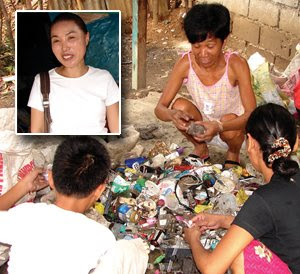
Columba (inset) when working in Metro Manila
Hope turns into a nightmare
As an illegal worker, Aling Maria was often subjected to different abuses like underpayment, long hours of working without a day off and so on. But the worst thing was when one of her employers took advantage of her and made her pregnant. When she came home to the Philippines in October 1993 Mang Pepe and the family were very shocked to learn that Aling Maria carried a child in her womb. She hadn’t mentioned anything about this before. However, despite this they still welcomed her and the child with joy . . . but deep in their hearts there was a shadow of sadness, fear and uncertainty.
After a few days the tabloids reported that three Filipino overseas workers had been sent home because of being infected with HIV, the virus that causes AIDS – and that one of them was Aling Maria. These stories, and the rumors they spawned, continued for a month. Some relatives, neighbors and friends rejected Aling Maria. The children of Mang Pepe and Aling Maria were torn apart. Some wanted to quit school and leave the area. The family suffered greatly because of the stigma.
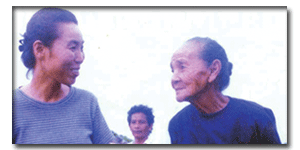
Columba with a friend in Manila
Confirmed HIV
Aling Maria and Mang Pepe went to the Department of Health (DOH) for a series of blood tests. The tests confirmed what Aling Maria knew already, that she and her ‘little mercy child,’ as Mang Pepe called his wife’s daughter had HIV. The doctor gave them counseling and advice and information about HIV/AIDS.
Ligaya is born
Aling Maria decided not to say in the hospital and continued to work as a pension plan insurance agent. In time she gave birth to a baby girl whom they named Ligaya. Gradually, however, Mang Pepe saw his dear wife turning into a picture of misery as she suffered from constant headaches and flu. Aling Maria was hoping for a miracle that would ease her agony. It was not to be. The HIV developed into full-blown AIDS. Her appetite disappeared until she couldn’t eat anymore. MangPepe and the children saw Aling Maria slowly dying. He prepared the family to accept her death as the will of God. She died on 15 December 1997, aged 46.
Like everyone else in Baclaran Church, I was deeply touched by MangPepe’s story, even though he had told it to me many times. I was touched by the great love of this simple man who accepted as his own a daughter who was the fruit of the brutal violation of his wife. MangPepe is ‘Tatay’ to Ligaya. Her schoolmates sometimes tease her because her features clearly show her Middle Eastern origins. But her Tatay stands by her, as do her brothers and sisters.
Baclaran Church [Wikipedia]
Proud to be her Tatay
Tatay Pepe is proud of Ligaya’s singing ability and smiled as she sang at the celebration in Baclaran. Ligaya is very proud of her Tatay and knows the depth of his love as a father. She has very uncertain health and is often in the hospital. The shadow of AIDS hangs over her.
St Joseph named Jesus, the Son of Mary, and thereby became his legal father. He loved Mary, his wife, and raised Jesus as his own son. MangPepe has gone through the agony of knowing that his wife was violated overseas, after dishonest employers had taken advantage of her in other ways. When she brought home a child who was not his, he made her his own. This latter-day St Joseph in Manila has given much joy to his daughter Ligaya as she has given much joy to him and others, like myself, who have come to know and love her.
I was in Baclaran Church that day at the invitation of Columba and, during an activity before Mass, came to know ‘Ligaya’ as a friend. Shortly before she died towards the end of 2004 I had the privilege of talking to her on Columba’s cellphone. She was a delightful child. The light of heaven upon her.

St Joseph and the Christ Child, El Greco [Web Gallery of Art]
The late American Scripture scholar Fr Raymond E. Brown SS points out that St Joseph, by taking Mary as his wife and by naming her Son, as the angel in today’s gospel told him to do, in Jewish law, became the legal father of Jesus, something more than being his foster-father, as he is often described. And because St Joseph was of the line of David, so was Jesus, as the Messiah was foretold to be.
The Church honours St Joseph above all as the Husband (or Spouse) of Mary. Pope Francis has underlined this by adding the words ‘and blessed Joseph her spouse’ to Eucharistic Prayers I, II and III, as they were added to the Roman Canon (now also known as ‘Eucharistic Prayer I’) by Blessed Pope John XXIII.
Mang Pepe totally welcomed Aling Maria back from the Middle East as his wife whom he loved, despite his initial shock at what had happened to her. And he totally welcomed her daughter Ligaya as his own, as St Joseph welcomed the Son of Mary as his own.
Today’s Gospel reminds us of the fact that the basic vocation, ie, call from God, of every married couple is to be spouses, not to be parents. Being parents is a consequence of their being spouses. I’m well aware that there are single parents, many of whom have never been married, who are heroically raising their children, often in very difficult circumstances. But it is God’s will that children be born within marriage.
St Joseph was a loving husband to Mary and a loving father to her Son Jesus, God who became Man. Mang Pepe continued to be a loving husband to Aling Maria until she died and was a proud and loving father to her daughter Ligaya, as I could see so clearly.
Today’s Gospel shows us something of the wonder of being called to be a husband and father and of the immense responsibility that goes with that. St Joseph as husband and father enabled Mary and Jesus to carry out the mission that God the Father had given them.
What applies to husbands/fathers applies equally to wives/mothers.
And the Gospel reminds us very clearly that in God’s plan the foundation of the family is marriage, that is, of husband and wife, of man and woman. It can never be anything else.
Motet for five voices (SATTB) by William Byrd (c. 1540-1623)
Antiphona ad communionem
Communion Antiphon Isaiah 7:14
Ecce Virgo concipiet, et pariet filium;
Behold, a Virgin shall conceive and bear a son;
et vocabitur nomen eius Emmanuel.
and his name will be called Emmanuel.

Fr Sean Martin
This story was published in the 20 November 2016 issue of Sunday Examiner, the English-language Catholic weekly of the Diocese of Hong Kong, edited by Australian Columban Fr James Mulroney. Fr Sean Martin, quoted in the story, is a Columban from County Meath, Ireland, who has been in the Philippines for more than 40 years. I have made one or two minor corrections about the location of the incident.
‘He was one of our best barangay captains and a great servant of the people,’ Father Sean Martin said from his parish in Liloan, Bonifacio, Misamis Occidental, of Jovani Romo, who was shot 14 times by unknown assailants and died on the road just 30 metres from his home in Barangay Kanokano on July 29. [Note: The barangay is the smallest administrative division in the Philippines.]
Romo’s is one of the faceless deaths in a Philippines swamped in a frenzied daily attack on the poor being carried out by the state under the guise of a war on drugs. He is one of the victims of the regular round of murders of human rights advocates, journalists and indigenous leaders protecting their land that has been going on for decades, whose murders now struggle to even get reported let alone investigated in the midst of the drug-related frenzy of bloodletting.
The silence surrounding their deaths is chilling, as what is being covered up by the curtain of silence that has been pulled across the steady flow of political murders, together with the rule of fear instigated by the current president, Rodrigo Duterte, becomes more and more difficult to uncover.
‘Romo was not involved in drugs,’ Father Martin attests, ‘but he was deeply involved in protecting the forests of Mount Malindang, a unique and beautiful park, which has already been depleted by some 30 per cent.’
Romo had crossed swords with vested interests in the area through his work with the Department of Energy and Natural Resources aimed at stopping the logging and protecting the wildlife in the area which houses some of the richest varieties of fauna and flora in Asia.
‘That is one possibility,’ Father Martin told the Sunday Examiner. ‘But the reason could have other political overtones, as he was in line to become the chairperson of the Association of Barangay Councils in Bonifacio, as the incumbent has completed three terms and must step down.’
Father Martin said that he cannot unearth any information about the reason for Romo’s death, as the atmosphere of fear is still so prevalent in the area.
‘Celebrating the funeral Mass was a profoundly moving event,’ the Columban missionary said. ‘He was only 34-years-old and had made great improvements in the barangay.’
However, the longtime missionary believes that the motive for the crime, as well as the identity of those who ordered and carried out the murder will never be known.
‘The court system is so weak and so many officials are compromised that the problem will never be solved by relying on them, so we can only try and minimise the killings as best we can,’ he lamented.

Mount Malindang [Wikimapia.org]
Father Martin added in an email to me: ‘[Jovani] did a lot of work and had good projects for the people. He was encouraging the people to plant flowers. It would have been successful because the barangay is so high up on Malindang and the hills are so steep.
‘It took me a good while to adjust to the fact that Jovani had been killed so violently.’
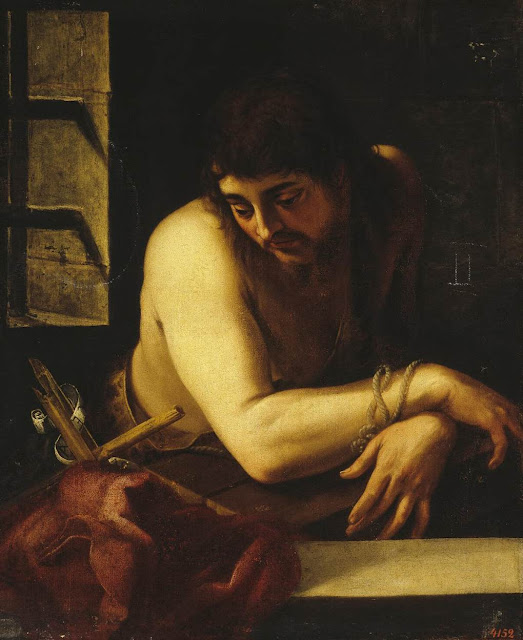
St John the Baptist in Prison
Juan Fernández de Navarrete [Web Gallery of Art]
Readings (New American Bible: Philippines, USA)
Readings (Jerusalem Bible: Australia, England & Wales, India [optional], Ireland, New Zealand, Pakistan, Scotland, South Africa)
Gospel Matthew 11:2-11 (New Revised Standard Version, Catholic Edition, Canada)
When John heard in prison what the Messiah was doing, he sent word by his disciples and said to him, “Are you the one who is to come, or are we to wait for another?” Jesus answered them, “Go and tell John what you hear and see: the blind receive their sight, the lame walk, the lepers are cleansed, the deaf hear, the dead are raised, and the poor have good news brought to them. And blessed is anyone who takes no offense at me.”
As they went away, Jesus began to speak to the crowds about John: “What did you go out into the wilderness to look at? A reed shaken by the wind? What then did you go out to see? Someone dressed in soft robes? Look, those who wear soft robes are in royal palaces. What then did you go out to see? A prophet? Yes, I tell you, and more than a prophet. This is the one about whom it is written,
‘See, I am sending my messenger ahead of you,
who will prepare your way before you.’
Truly I tell you, among those born of women no one has arisen greater than John the Baptist; yet the least in the kingdom of heaven is greater than he.
Responsorial Psalm [Philippines, USA Lectionary]
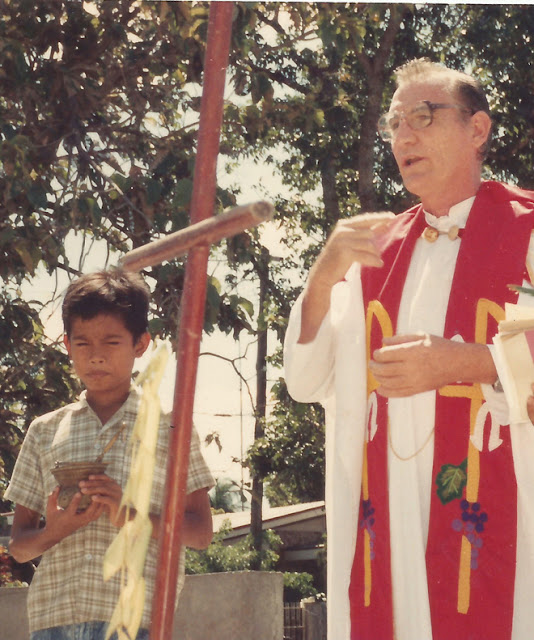

It was to the credit of the Columbans that I was accepted as a candidate for priesthood. That was back in 1969 when I was completing Form Seven in high school at St John’s College, Hastings, New Zealand.
I was accepted despite the fact that I was not only deaf but I also suffered a serious speech impediment which was a consequence of my hearing disability. My deafness was more peculiar rather than pronounced. I cannot hear high-pitched sounds. As a result, I cannot hear many of the consonants in my own ‘native’ English language.
Read the rest of Fr Tom Rouse’s article and the responses to it of five Deaf Filipinos, Norman, Willy, Eli, Noel and Marinela, here.
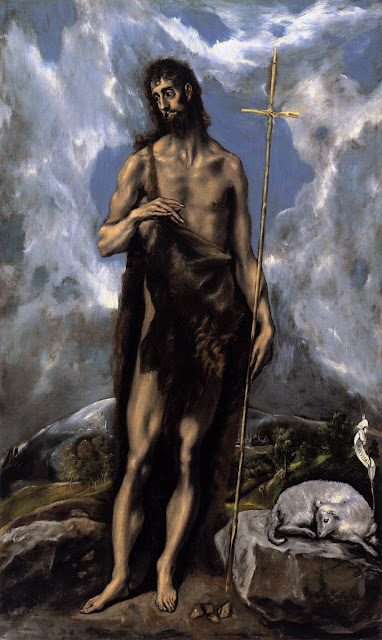
St John the Baptist, El Greco, c.1600 [Web Gallery of Art]
Readings (New American Bible: Philippines, USA)
Readings (Jerusalem Bible: Australia, England & Wales, India [optional], Ireland, New Zealand, Pakistan, Scotland, South Africa)
Gospel Matthew 3:1-12 (New Revised Standard Version, Catholic Edition)
In those days John the Baptist appeared in the wilderness of Judea, proclaiming, “Repent, for the kingdom of heaven has come near.” This is the one of whom the prophet Isaiah spoke when he said,
“The voice of one crying out in the wilderness:
‘Prepare the way of the Lord,
make his paths straight.’”
Now John wore clothing of camel’s hair with a leather belt around his waist, and his food was locusts and wild honey. Then the people of Jerusalem and all Judea were going out to him, and all the region along the Jordan, and they were baptized by him in the river Jordan, confessing their sins.
But when he saw many Pharisees and Sadducees coming for baptism, he said to them, “You brood of vipers! Who warned you to flee from the wrath to come? Bear fruit worthy of repentance. Do not presume to say to yourselves, ‘We have Abraham as our ancestor’; for I tell you, God is able from these stones to raise up children to Abraham. Even now the ax is lying at the root of the trees; every tree therefore that does not bear good fruit is cut down and thrown into the fire.
“I baptize you with water for repentance, but one who is more powerful than I is coming after me; I am not worthy to carry his sandals. He will baptize you with the Holy Spirit and fire. His winnowing fork is in his hand, and he will clear his threshing floor and will gather his wheat into the granary; but the chaff he will burn with unquenchable fire.”
Responsorial Psalm (NAB Lectionary, Philippines, USA)
Repent, for the kingdom of heaven has come near is the stark message of St John the Baptist. He says of his ministry, I baptize you with water for repentance. The response to the Responsorial Psalm is Justice shall flourish in his time, and fullness of peace for ever.
Repentance, justice and peace go together – with God’s mercy. Pope Francis has spoken many times about that. In that context he has also reminded us, especially priests, of the importance of the sacrament of confession/penance/reconciliation.
Jesus speaks to us through his Church this Sunday reminding us of the importance of repenting in order to welcome him into our lives. In Advent we prepare to celebrate his birth and also for his Second coming, whenever that will be. And we also prepare for his daily coming into our lives.
We frequently fail Jesus by our sins. But he doesn’t leave us in despair. He doesn’t turn his back on us.
In his Wednesday General Audience on 20 November 2013 Pope Francis spoke about the remission of sins. As he often does, he used three points. The first was that the principal agent in the forgiveness of sins is the Holy Spirit. I’ll print the rest of his talk and highlight parts of it. I’ll also add some (comments).
And we come to the second element: Jesus gave the Apostles the power to forgive sins. It is a little difficult to understand how a man can forgive sins, but Jesus gives this power. The Church is the depository of the power of the keys, of opening or closing to forgiveness. God forgives every man in his sovereign mercy, but he himself willed that those who belong to Christ and to the Church receive forgiveness by means of the ministers of the community. (This means that the sacrament of confession is an explicit expression of God’s will and that God forgives us through the ministry of the priest.) Through the apostolic ministry the mercy of God reaches me, my faults are forgiven and joy is bestowed on me. (God’s mercy and the joy that comes from this, two realities that Pope Francis has spoken about again and again.) In this way Jesus calls us to live out reconciliation in the ecclesial, the community, dimension as well. And this is very beautiful. The Church, who is holy and at the same time in need of penitence, accompanies us on the journey of conversion throughout our life. The Church is not mistress of the power of the keys, but a servant of the ministry of mercy and rejoices every time she can offer this divine gift.
Perhaps many do not understand the ecclesial dimension of forgiveness, because individualism, subjectivism, always dominates, and even we Christians are affected by this. Certainly, God forgives every penitent sinner, personally, but the Christian is tied to Christ, and Christ is united to the Church. For us Christians there is a further gift, there is also a further duty: to pass humbly through the ecclesial community. (Through baptism we are related to Jesus Christ and to one another through the Church. It can never be a matter simply of ‘Jesus and I’, though he calls each of us into an intimate relationship with him, but never apart from his and our relationship with others.) We have to appreciate it; it is a gift, a cure, a protection as well as the assurance that God has forgiven me. I go to my brother priest and I say: ‘Father, I did this…’. And he responds: ‘But I forgive you; God forgives you’. At that moment, I am sure that God has forgiven me!
And this is beautiful, this is having the surety that God forgives us always, he never tires of forgiving us. And we must never tire of going to ask for forgiveness. You may feel ashamed to tell your sins, but as our mothers and our grandmothers used to say, it is better to be red once than yellow a thousand times. We blush once but then our sins are forgiven and we go forward.

Confession, Giuseppe Maria Crespi, 1712 [Web Gallery of Art]
Lastly, a final point: the priest is the instrument for the forgiveness of sins. God’s forgiveness is given to us in the Church, it is transmitted to us by means of the ministry of our brother, the priest; and he too is a man, who, like us in need of mercy, truly becomes the instrument of mercy, bestowing on us the boundless love of God the Father. Priests and bishops too have to go to confession: we are all sinners. Even the Pope confesses every 15 days, because the Pope is also a sinner. (I often encourage people to go to confession and provide opportunities for them to do so. But it seems that most don’t see any need for confession. But on one occasion here in the Philippines when I was asked to celebrate Mass at the end of a recollection day for students in a Catholic girls’ high school I made myself available for confession. It became very clear that this was what the girls wanted. We ended up cancelling the Mass so that all could go to confession and having it on another day in the school.) And the confessor hears what I tell him, he counsels me and forgives me, because we are all in need of this forgiveness. Sometimes you hear someone claiming to confess directly to God… Yes, as I said before, God is always listening, but in the Sacrament of Reconciliation he sends a brother to bestow his pardon, the certainty of forgiveness, in the name of the Church. (God sends a brother to assure of us his forgiveness. This is another expression of the reality expressed so beautifully at the beginning of St John’s Gospel, 1:14, words that we use when we pray the Angelus: And the Word became flesh and lived among us.)
Pope Francis hearing the confessions of young adults
Pope Francis goes to confession
The service that the priest assumes a ministry, on behalf of God, to forgive sins is very delicate and requires that his heart be at peace, that the priest have peace in his heart; that he not mistreat the faithful, but that he be gentle, benevolent and merciful; that he know how to plant hope in hearts and, above all, that he be aware that the brother or sister who approaches the Sacrament of Reconciliation seeking forgiveness does so just as many people approached Jesus to be healed. The priest who is not of this disposition of mind had better not administer this sacrament until he has addressed it. The penitent faithful have the right, all faithful have the right, to find in priests servants of the forgiveness of God. (While Pope Francis doesn’t call priests a ‘brood of vipers’, as St John the Baptist calls some of the Sadducees and Pharisees in today’s gospel, he implies that those who are not ‘gentle, benevolent and merciful’ in the confessional are such.)
Dear brothers, as members of the Church are we conscious of the beauty of this gift that God himself offers us? Do we feel the joy of this cure, of this motherly attention that the Church has for us? Do we know how to appreciate it with simplicity and diligence? Let us not forget that God never tires of forgiving us; through the ministry of priests he holds us close in a new embrace and regenerates us and allows us to rise again and resume the journey. For this is our life: to rise again continuously and to resume our journey.
[This is the form of absolution given by the priest. The highlighted words are essential for the validity of the sacrament.
God, the Father of mercies,
through the death and the resurrection of his Son
has reconciled the world to himself
and sent the Holy Spirit among us
for the forgiveness of sins;
through the ministry of the Church
may God give you pardon and peace,
and I absolve you from your sins in the name of the Father, and of the Son and of the Holy Spirit.]
This extract from Handel’s Messiah includes part of the quotation from the Prophet Isaiah used by St Matthew when he tells us that it refers to St John the Baptist. Handel uses the Authorized (King James) Version of the Bible, slightly adapting it.
Comfort ye, comfort ye my people, saith your God.
Speak ye comfortably to Jerusalem, and cry unto her,
that her warfare is accomplished,
that her iniquity is pardoned . . .
The voice of him that crieth in the wilderness,
Prepare ye the way of the Lord,
make straight in the desert a highway for our God.
Every valley shall be exalted,
and every mountain and hill [shall be] made low:
and the crooked [shall be made] straight,
and the rough places plain (Isaiah 40:2-4).
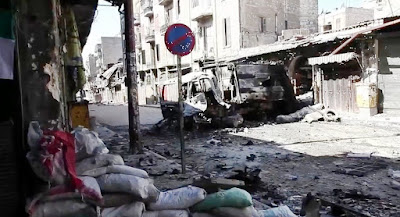
Aleppo, Syria [Wikipedia]
Readings (New American Bible: Philippines, USA)
Readings (Jerusalem Bible: Australia, England & Wales, India [optional], Ireland, New Zealand, Pakistan, Scotland, South Africa)
Gospel Matthew 24:37-44 (New Revised Standard Version, Catholic Edition, Canada)
Jesus said to his disciples: For as the days of Noah were, so will be the coming of the Son of Man. For as in those days before the flood they were eating and drinking, marrying and giving in marriage, until the day Noah entered the ark, and they knew nothing until the flood came and swept them all away, so too will be the coming of the Son of Man. Then two will be in the field; one will be taken and one will be left. Two women will be grinding meal together; one will be taken and one will be left. Keep awake therefore, for you do not know on what day your Lord is coming. But understand this: if the owner of the house had known in what part of the night the thief was coming, he would have stayed awake and would not have let his house be broken into. Therefore you also must be ready, for the Son of Man is coming at an unexpected hour.
One will be taken and one will be left (Matthew 24:40 and 41).
In February 2000 a friend of mine, Daisy, an engineer who teaches at Xavier University, Cagayan de Oro, was travelling home to Ozamiz City for the weekend. This involved a journey of about three or four hours by road to Mukas, Kolambugan, Lanao del Norte, where the bus then went on board a ferry for the 20-minute trip across Panguil Bay to Ozamiz City. While waiting for the bus to take the next ferry from Mukas Daisy got off and bought some crabs, a favourite with Filipinos.
Because of the crabs Daisy went up on the upper deck of the ferry instead of sitting in the bus. Halfway across the bay there was a huge explosion. 37 passengers on the three buses on board were killed and others injured.
Then two will be in the field; one will be taken and one will be left. Two women will be grinding meal together; one will be taken and one will be left. We could add, Two women will be travelling together in a bus; one will be taken and one will be left.
On Thursday 21 November 2013 Pope Francis met the Filipino community in Rome in St Peter’s Basilica. With them, in the light of the recent calamities in the Philippines, a powerful earthquake in October and Super Typhoon Haiyan/Yolanda in November, he asks why these things happen.
Pope Francis doesn’t offer any easy answers. He encourages us to ask God ‘Why?’, like little children, as this will catch the attention of our loving Father.
The ending of the old liturgical year and the beginning of the new both remind us of the importance of being ready whenever the Lord comes. This readiness is essential both for the individual and for the whole Christian community. When Jesus returns will he find that we have built a community where God’s justice reigns? At the moment of the death of each of us will be in a right relationship with God? Will we have directed our lives towards him?
One way to be ready for whatever may come is to go to confession regularly.
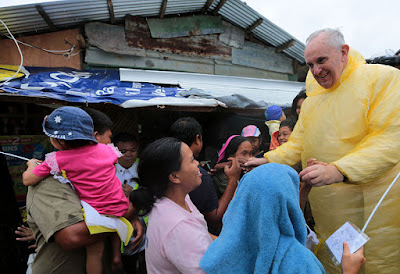
Pope Francis with victims of Haiyan/Yolanda
Palo, Leyte, 17 January 2015 [Wikipedia]
The old hymn, O Christ who art the light and day, a translation by R. R. Terry of the original Latin Christe Qui Lux Es Et Dies, in a setting here by English composer William Byrd, is often sung as part of Compline, the Night Prayer of the Church. It is a hymn that recognises the reality of sin but also God’s desire to protect us. Though it’s not specifically an Advent hymn it recalls the purpose of that blessed season that we are just beginning: to prepare to celebrate the First Coming of Jesus at his birth but also to prepare for his daily coming into our lives and for his Second Coming at the end of time.
Antiphona ad Introitum
Entrance Antiphon Cf. Psalm 24[25]:1-3
Ad te levávi ánimam meam, Deus meus,
To you, I lift up my soul, O my God.
in te confído, non erubéscam.
In you, I have trusted; let me not be put to shame.
Neque irrídeant me inimíci mei,
Nor let my enemies exult over me;
étenim univérsi qui te exspéctant non confundéntur.
and let none who hope in you be put to shame.